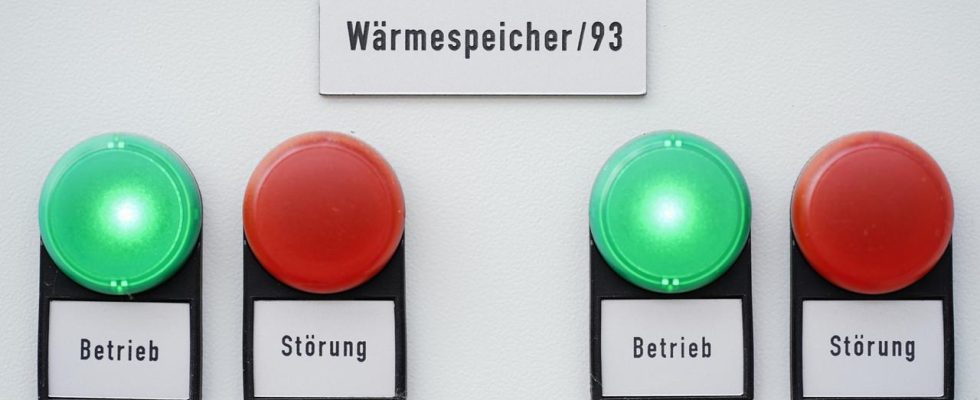After much controversy, the heating law should now be in place. The traffic light has reached an agreement, especially in terms of support for consumers. So there should be a “climate speed bonus”.
Hardly any legislative proposal has been as hotly debated in recent months as the Building Energy Act – GEG for short. Above all, the question remained open as to how the obligation to install new heating systems that are 65 percent CO2-neutral from 2024 onwards can be socially cushioned. An answer has now been found to this – a real breakthrough, according to Green Party circles.
A “climatespeed bonus”
In addition to the existing basic subsidy of 30 percent of the costs for climate-friendly heating, two subsidy models are being added: one for low earners and one for those who switch to a CO2-neutral form of heating earlier than required by law. This “climate speed bonus” is up to 20 percent. The limit for low earners should be around 40,000 euros per year. There is a further 30 percent subsidy. The bonuses can also be combined with each other.
So someone who has an annual income of 36,000 euros can get 60 percent of the new heating system. If this homeowner is also entitled to the “climate speed bonus”, it would even be 80 percent in purely mathematical terms – however, state subsidies are capped at a maximum of 70 percent.
Municipal heat planning in large cities from 2026
The general obligation to convert new heating systems from January 1, 2024 was already made more flexible in terms of time in the “guard rails” that the parliamentary group had laid down two weeks ago. First of all, the municipality is now obliged to submit a heating plan. According to the “guard rails”, this should be available by 2028 at the latest. What is new is that larger cities should already have heat planning by 2026. Only then are individual homeowners obliged to comply with the requirements of the GEG when installing new heating systems. But if you don’t wait for the heat planning to start and convert earlier yourself, you can now look forward to a financial reward.
The openness to technology in the new GEG, much touted by the liberals, will also remain the same. However, it is also important that consumers are obliged to seek energy advice in order to be informed about the consequences of installing a specific type of heating. The Greens say that this passage should prevent “worse”. Above all, the further installation of fossil gas heating systems, which can be converted to hydrogen at some point, is considered a very unsafe and possibly expensive investment. In the expert hearing on the GEG in the Bundestag last week, Sandra Rostek from the Federal Association for Renewable Energy even called gas heating systems that can be operated with hydrogen a “fata morgana”.
adhered to schedule, coalition discipline in the future too
And what’s next? Because even if the traffic light factions have now come to an agreement, the tedious path that the GEG has to go has not yet been completed. After the first reading in the Bundestag last week, the members of the specialist committees are currently bending over the work. They can get advice from external experts. At the same time, officials in the Federal Ministry of Economics are currently writing the final draft law – this is to be forwarded to the Bundestag on Thursday. If this happens as planned, the heating law can be voted on next week.
The responsible committees are to receive the amended law as early as this Friday. That would be before the summer break – and thus within the time frame set by the traffic light itself. If the Bundestag agrees, it is the Bundesrat’s turn. The next meeting is scheduled for July 7th. A problem, because the countries theoretically have three weeks before they have to vote on the law. Shortening the deadline could solve this problem and help the traffic light to get the long-controversial heating law through. Otherwise, the Federal Council would have to meet for a special session during the summer break – and that is considered unlikely. The public irritation is already far too great for that.
several nights negotiated
The months-long, sometimes hard-fought dispute over the heating law must have left its mark on everyone involved. In order to incorporate the changes as quickly as possible, the leaders of the SPD, FDP and Greens recently spent several nights negotiating. After the law became public at a very early stage, a fundamental dispute about the right climate policy broke out within the traffic light.
The FDP in particular quarreled with what they saw as the ideological approach of the Greens. Individual FDP politicians even described the project as a “nuclear bomb” and compared the policies of Economics Minister Robert Habeck with those of autocrats. A consequence of the dispute: the approval ratings for the traffic light went down in the basement. In the youngest ARD Germany trend only one in five rated government policy positively. This is one of the reasons why a dispute like the one about the heating law should not be repeated, say many members of the traffic light coalition.


